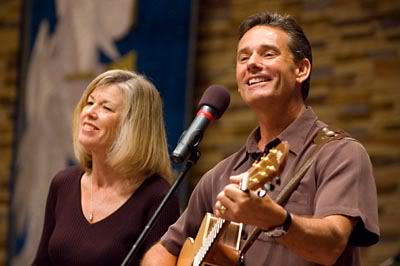
17 May 2013 CM –
It happened again yesterday. I was attending one of those hip, contemporary churches — and almost no one sang. Worshippers stood obediently as the band rocked out, the smoke machine belched and lights flashed. Lyrics were projected on the screen, but almost no one sang them. A few women were trying, but I saw only one male (other than the worship leader) making the attempt.

A few months ago I blogged, “Have Christians Stopped Singing?” I did some research, and learned that congregational singing has ebbed and flowed over the centuries. It reached a high tide when I was a young man – but that tide may be going out again. And that could be bad news for men.
First, a very quick history of congregational singing.
Before the Reformation, laypersons were not allowed to sing in church. They were expected to stand mute as sacred music was performed by professionals (priests and cantors), played on complex instruments (pipe organs), and sung in an obscure language (Latin).

Reformers gave worship back to the people in the form of congregational singing. They composed simple tunes that were easy to sing, and mated them with theologically rich lyrics. Since most people were illiterate in the 16th century, singing became an effective form of catechism. Congregants learned about God as they sang about God.
A technological advance – the printing press – led to an explosion of congregational singing. The first hymnal was printed in 1532, and soon a few dozen hymns became standards across Christendom. Hymnals slowly grew over the next four centuries. By the mid 20th century every Protestant church had a hymnal of about 1000 songs, 250 of which were regularly sung. In the church of my youth, everyone picked up a hymnal and sang every verse of every song.
About 20 years ago a new technological advance – the computer controlled projection screen – entered America’s sanctuaries. Suddenly churches could project song lyrics for all to see. Hymnals became obsolete. No longer were Christians limited to 1,000 songs handed down by our elders.
At first, churches simply projected the songs everyone knew – hymns and a few simple praise songs that had come out of the Jesus Movement. People sang robustly.
But that began to change about ten years ago. Worship leaders realized they could project anything on that screen. So they brought in new songs each week. They drew from the radio, the Internet, and Worship conferences. Some began composing their own songs, performing them during worship, and selling them on CD after church.
In short order we went from 250 songs everyone knows to 250,000+ songs nobody knows.
Years ago, worship leaders used to prepare their flocks when introducing a new song. “We’re going to do a new song for you now,” they would say. “We’ll go through it twice, and then we invite you to join in.”

That kind of coaching is rare today. Songs get switched out so frequently that it’s impossible to learn them. People can’t sing songs they’ve never heard. And with no musical notes to follow, how is a person supposed to pick up the tune?
And so the church has returned to the 14th century. Worshippers stand mute as professional-caliber musicians play complex instruments, sung in an obscure language. Martin Luther is turning over in his grave.
What does this mean for men? On the positive side, men no longer feel pressure to sing in church. Men who are poor readers or poor singers no longer have to fumble through hymnals, sing archaic lyrics or read a musical staff.
But the negatives are huge. Men are doers, and singing was one of the things we used to do together in church. It was a chance to participate. Now, with congregational singing going away, and communion no longer a weekly ordinance, there’s only one avenue left for men to participate in the service – the offering. Is this really the message we want to send to men? Sit there, be quiet, and enjoy the show. And don’t forget to give us money.
There’s nothing wrong with professionalism and quality in church music. The problem isn’t the rock band, or the lights, or the smoke machine. The key is familiarity. People enjoy singing songs they know.
How do I know? When that super-hip band performed a hymn, the crowd responded with gusto. People sang. Even the men.
Dear Viewers in Christ, if you find this article edifying to you, please share with your friends or loved ones by using the social media plugs (Share, Email to this article). The Lord will surely bless you as you bless others. May the Lord’s peace and love be with you.
Excerpts & Picture Reference:
Picture Reference:
http://www.galleysound.com/concerts.html
http://eycentre.ca/home/ottawa-concerts




We use screens and no hymnals in our church and we sing mostly contemporary praise songs and not hymns, but we do have the rule that you do not introduce more than one new song at a time, so that everyone still can sing along.
In fact, I struggled with this when helping with a church plant the last 2 or 3 years — I knew too many songs. Finally, we settled on a collection of songs that "everyone" knew and I could pick from those songs and not introduce more than one new song each time. Things worked out better that way.
I've now finished my time with that church plant, as they have managed to raise up a local worship leader, and am back in my home church.
Agree. It's even tougher for musicians who have to learn new songs (plural!) every week, new chord progressions, tempo, melody, intros and endings. It became more of a mental thing (trying to remember) and less of a heart thing (achieved after having sung it for years in the heart).
We can see it is even more tougher for the body of Christ to sing it, let alone remember. Every song must reach the stage of high familiarity aka the song becomes personally close to the heart.
And the only way to do this is to STOP thinking that much repetition makes a song boring. Instead more repetition actually makes a praise song increase in value. This is how the mind works, just like a student learning the same mathematical formula again and again until they finally master it and as a result they will really like doing it regardless of how they feel.
It is a matter of the heart, in All Saint's Cathedral, Kota Kinabalu, some people just stand like statues whether the Hymns or Praise and Worship songs are being sung, i am a musician and am 59 years old and i can follow in singing Hymns or P&W songs because i WANT to sing for the Lord., Short choruses are so easily pick up if our HEART WANTS to, HYMNS are no different, people refuses to sing because their HEARTS chooses NOT to.I challenge you to name me a Church that has a Congregation that EVERYONE sings because of FAMILIAR songs, if you have a camera sweeping through the congragation at every service, you will see who would sing or try to follow (learn) to sing along not matter how new the tune maybe. As for reading notes, 90% of the congrgation can't read music, so what's the use of them having a Hmn book in their hands?, However, i do agree that in certain Churches if the congregation have more older people, the P&W team should not play music and songs that are to heavy, fast or loud.
Worship, is from the HEART not the head, if we think modern P&W is wrong, we can never see our young people coming to our own Churches, we will lose them to the Churches that has modern contempoary Worship songs and that is a fact.
No Anglican Church(of which i belong to) in the World can claim to have a congregation where everyone sings, i have been to All Souls Church, Langham Place in London, where more Hymns are sung back by an Orchestra, yet i see many people not singing, so what do you think?
Are we only suppose to sing the tunes that are familiar to us? scripture teaches us to "sing a new song to the Lord". if the HEART wants to OBEY,
If our HEATS are right with GOD,WE will sing to PRAISE the LORD, not just because we want to sing the songs we know.
May the Grace of our Lord Jesus be with you all. Amen.
I'm a song writer my self, i believe there is no rule in worshiping the LORD. But I also understand that bringing a new song in the service will change the atmosphere from WORSHIPING to LEARNING the song. It change the direction a lot! But why exactly? The direction of worship should be HIM.
But one thing for sure, standing up on the stage as worship leader I learned a lot. I learn that i dont, Im not qualified, and I am not suppose to bring something like what the congregration felt good, comfortable and easy for them..same goes to me! Im not suppose to bring a song that only dear to me…….. but when the congregrations and the worship leader and team knows that WORSHIP is ALL about HIM, it doesnt matter anybody know the song or not.. Song selection from Hymns to Contemporary P&W is important though..pick a song that direct peoples mind, heart and soul only to God..The atmosphere and the breaktrough part is not our job to do..its the HOLY SPIRIT, all we need to do is KNOW WHAT WE ARE DOING, KNOW THAT WE SANG OF HIS GRACE and HE WILL DO HIS PART……. Amen